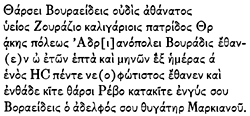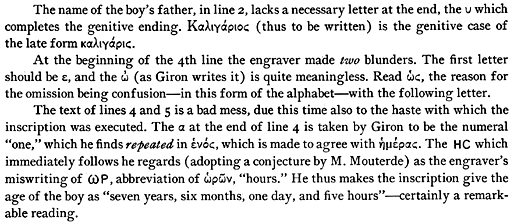
|
|||
|
|
|||
|
Giron reads:
He translates as follows: Courage Bouraidis, personne n'est immortel, fils de Zourazios, caligarius, de patrie de Thrace, (natif) de la ville d'Andrinople. Bouraidis est mort à sept ans, six mois, un jour et cinq (heures), il est mort nouvellement baptisé et ici repose. Courage Rébou, pres de toi repose ton frère Bouraidis, ô fille de Marcien. Some of the errors made by the engraver are obvious enough, it is not necessary to call attention to them all. It is plain that he gave so much attention to the beauty and regularity of the letters of the inscription that he sometimes failed to copy the text exactly. The name of the boy who is here commemorated occurs thrice and is
written in three different ways. Giron thinks of a Thracian origin of
the name, since
Some mistake was made here, no doubt, in the carving of the
inscription, but the preceding solution of the difficulty is hardly
satisfactory. I would venture to suggest that the A at the end of line
4 should be |
|||
|
|
|||
|
|
|||
|
Created by the Digital
Documentation Center at AUB
in collaboration with Al
Mashriq of Høgskolen i
Østfold, Norway. 990212 MB - Email: hseeden@aub.edu.lb |

 "is found in many Thracian
proper names," and he refers to Kretschmer's Einleitung in
d. Geschichte d. griechischen Sprache. This may be the case, but
it is to be remembered that
"is found in many Thracian
proper names," and he refers to Kretschmer's Einleitung in
d. Geschichte d. griechischen Sprache. This may be the case, but
it is to be remembered that  is a known Greek
name, and that this is the form (varied by the itacism) which occurs
in the last line of our inscription. The vowel of the first syllable
might be written as
is a known Greek
name, and that this is the form (varied by the itacism) which occurs
in the last line of our inscription. The vowel of the first syllable
might be written as  under the influence of the
labial consonant.
under the influence of the
labial consonant.

 , and that the first word in line 5
(after the initial
, and that the first word in line 5
(after the initial  ) was originally
) was originally  , the two letters
, the two letters  having been
omitted by a very common oversight.
having been
omitted by a very common oversight.